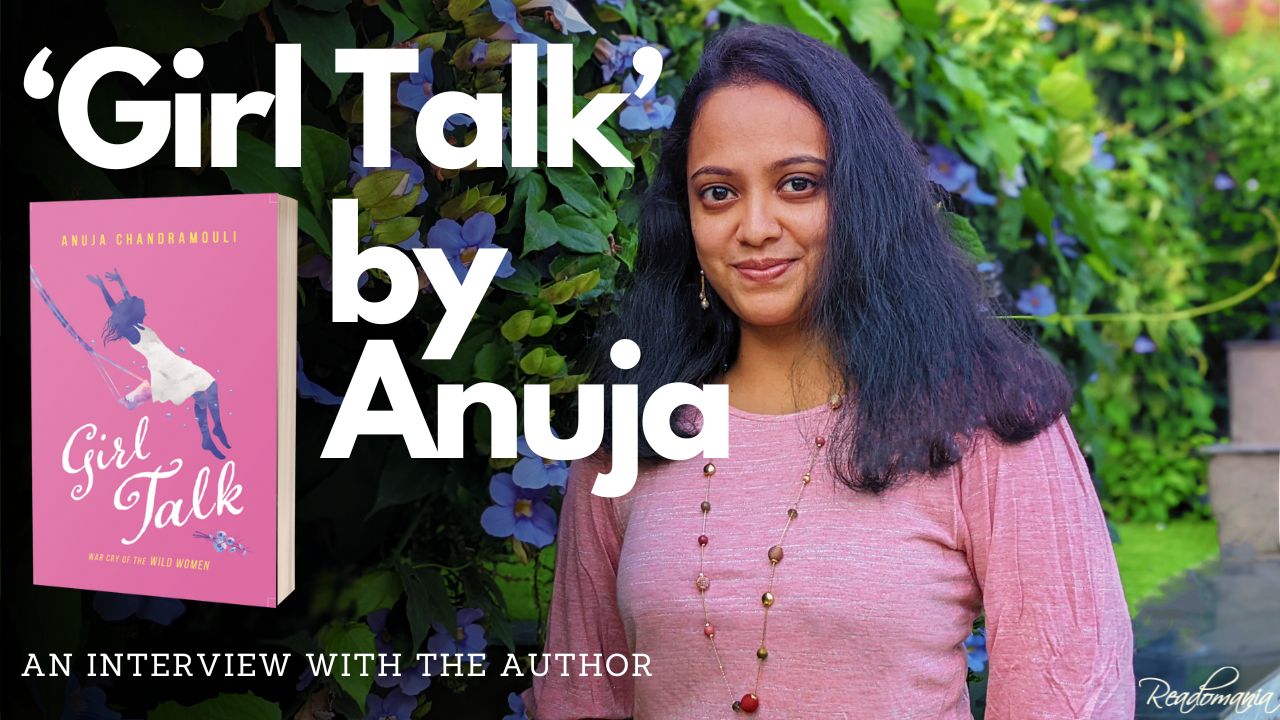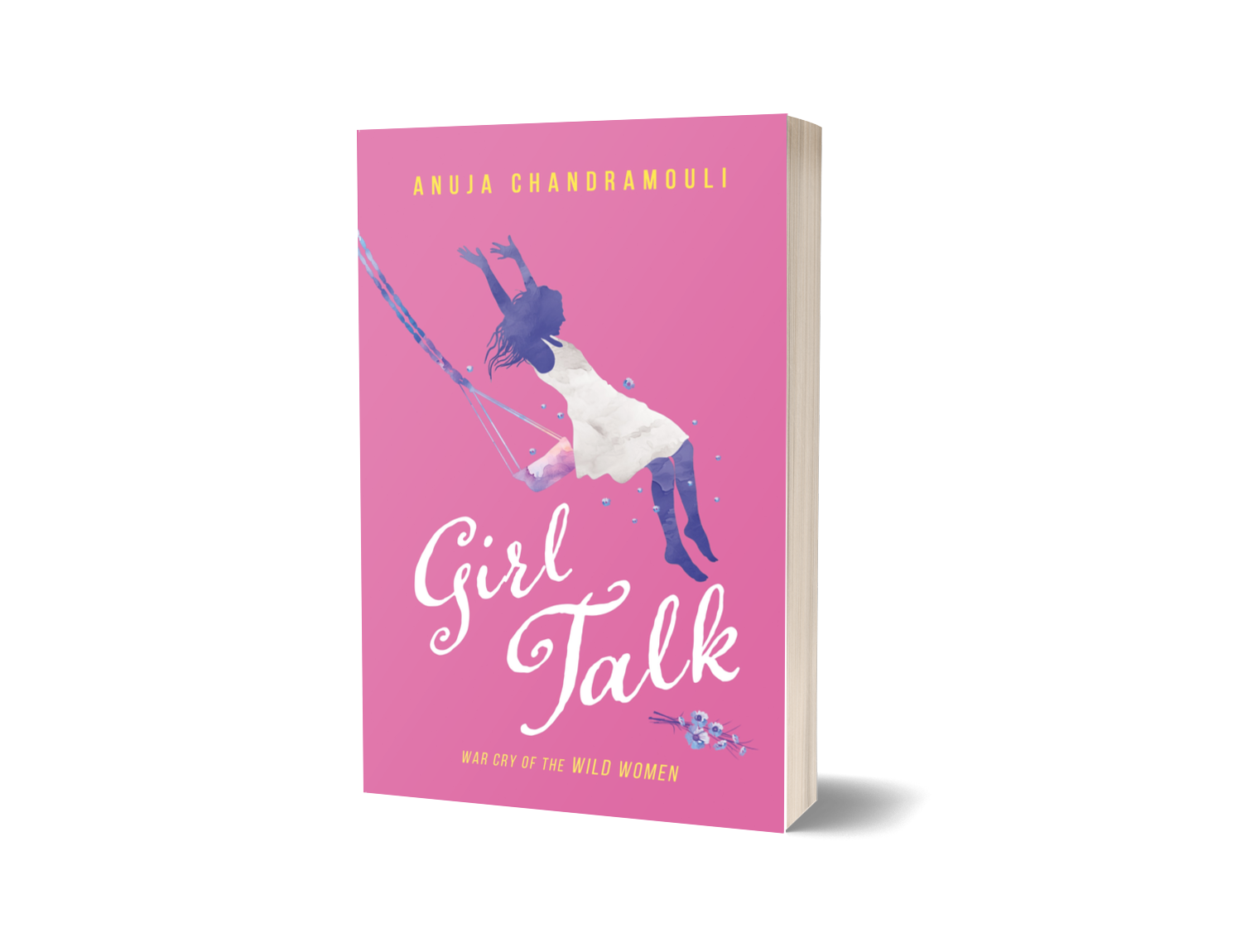Hello, Anuja. Congratulations on the launch of Girl Talk. The book has been receiving awesome reviews!
Readomania: Anuja, you have been popular for your historical and mythological books, what exactly are you attempting with a narrative like GIRL TALK which is so different from your usual writing?
Anuja: GIRL TALK happened because I wasn’t quite handling the lockdown with anything close to grace and was secretly worried that the end of the world was upon us. I felt as if I had done nothing remotely worthwhile with my life. At the time, I reached out to friends, and we used to have long conversations about everything and nothing. That’s how the foundation for GIRL TALK was laid. That and the fact that friends and family members have been bugging me to write something, anything, other than mythology or historical fiction!
Some of the girls were insistent I try my hand at erotica or romance, I decided to take a stab at messy love in all its unvarnished glory. As the title suggests, I wanted the book to feel exactly like girls getting together and schmoozing—a gossipy, scandalous conversation that is replete with shared confidences pertaining to personal matters, boys, steamy sex, all things taboo, and a lot of laughter even if the themes can feel dark and intense.
Readomania: There’s a line in the book: ‘The problem with the world was that everybody was too busy planning for the future and unable to savor the present.’ Is that your world view?
Anuja: It is most certainly a personal view. Most of us are so busy using the lessons of the past to put together a perfect future that we don’t really bother to be present in the present. Every moment is precious and contains a world of possibility that is fully within reach, just so long as you can muster the strength to simply cater to the demands of a given moment without letting it slip by while being preoccupied with infinite nothings that are unlikely to amount to anything.
Readomania: In each of your tales, most of the wild characters come to a bad end for following their heart. Is GIRL TALK a cautionary tale on the perils of pleasure?
Anuja: Not at all! GIRL TALK is merely an acknowledgement of the obvious fact which most choose to be oblivious about, that pleasure and pain are two sides of the same coin and chasing after one is tantamount to pursuing the other. Moreover, the book is a cautionary tale about cautionary tales which have been handed down over the eons about how women will come to a bad end if they dare to follow through on their impulse to be an active pleasure seeker. Women are taught to shelve their desires and choose sacrifice over personal satisfaction with the result that too many give up on their dreams and wallow in self or socially-inflicted misery, bitterness and resentment as there are no medals being handed out to women who are made to do their duty. Women are oppressed, suppressed and depressed and when they break free they might end up doing something that qualifies as reckless endangerment.
GIRL TALK makes a case for personal freedom to do what feels right even if it is supposedly wrong. Who the hell decides these things anyway? Women are well within their rights to follow the whims of their hearts and even if mistakes happen and a mess is made, they don’t deserve to be judged and punished for it, especially since male desire with all its excesses is routinely legitimized and championed. Ultimately our mistakes help us learn and grow and locking girls in cages to prevent them from erring is a fool’s move because it is both counter-productive and cruel.
Readomania: Following the same rhetoric, here is another quote from the book: ‘Why settle for a single love story when you can star in a thousand?’ Do you believe this is the secret dream of most women?
Anuja: This is something I feel strongly about. We are repeatedly told that we must live and die for ‘THE ONE’ and while I admit that Neo from The Matrix which made gazillion bucks milking this concept for all its worth is all kinds of cute, the sad truth is the real-world consequence of this flawed view is anything but pretty. In the past, Sati and Jauhar claimed the lives of many simply because too many believed that a woman’s place is by the side of her man, her one and only, in life and death. Widows are routinely stigmatized, brutalized, cast out, exploited or condemned to a lonely existence to this day.
It is high time we normalized the fact that people may have the starring or supporting role in the many stories that make up one life. They may be love stories or even more likely to be horror stories and that is perfectly fine. But this business with ‘THE ONE’ is unrealistic, impractical and may not yield the best dividends if we insist on shoving it down the throats of romantics and cynics alike.
Readomania: It is believed that men are hard and unyielding like a rock while women are like the essence of air that shapes and reshapes itself according to circumstances. Laws and morals by which people must live have been laid down by men. They decide what is noble and what is criminal. But women are guided by a mystic sense of justice. In their hearts, they always justify going beyond the law to commit a crime, even murder if the goal is to decimate evil. Is that what you, being a woman, have justified in this narrative?
Anuja: I have not tried to justify or vilify anything in particular. GIRL TALK is an entirely judgment free zone. That said, I do agree that the feminine force is fluid and fully capable of finding its way past challenging obstacles with courage, creativity, and good old-fashioned craftiness. There is an inherent balance in nature, which women tend to be more finely attuned to, and it is probably why the female of the species are instrumental in restoring harmony when the male ego is one the rampage by being kind and caring or transforming into an avenging fury depending on the need of the hour.
Readomania: Addiction is a major theme here. But it is not to the usual suspects like alcohol, drugs, or cigarettes. It is something else entirely. How did you decide to explore this mostly unexplored additive?
Anuja: Addiction and its ugly stepsibling obsession can take many forms. Everybody has a weakness for something or the other that can bring out this side. There are so many advisories for the aforementioned additives and treatment plans that can be availed off, but for those who fixate endlessly on love, lust, power, shoes, sugar, Instagram, WhatsApp, or will do just about anything to feed their need to feel valued or validated by others, amongst other things. are pretty much on their own.
There is so much menace in the mundane, and we are all alone when it comes to battling the monsters in our head and outside. But we don’t have to be. All it takes is the creation of a safe space, where you can deal with the destructive impulses that drive you in a healthy way, without having to worry about being chased by the demons of societal opinion. A safe space could be a cup of tea, a slice of cake offered by caring hands, a book, movie or a long walk down a winding road…
Readomania: We really enjoyed the ‘stream of consciousness’ technique that you have used to narrate the stories. Did you face any challenges in using this trope or does it come naturally to your writing style?
Anuja: With GIRL TALK, I wasn’t trying to be clever or display a surpassing knack for craftsmanship. I wasn’t trying to find that sweet spot between commercial success and critical acclaim. I was merely trying to follow Bruce Lee’s advice in ENTER THE DRAGON to not think but feel and therefore, just be. Of course, in all likelihood, I was running scared during the global pandemic and wrote all this stuff in what can only be described as a state of extreme panic and paranoia.
Readomania: Of all the crazy characters in this book, which one is your favorite? And why?
Anuja: I love all my characters, even the ones who are entirely hateful. But if pressed, I would have to say, Maamai. I love that she is a badass, sublimely confident and owns her mistakes, misdeeds, and all the mayhem she unleashed. She is tough and resourceful with a warm and tender core, filled to the brim with wit and wisdom. Most importantly, she lives life entirely on her own terms and is afraid of nothing. She is a possible reader’s favourite.
Readomania: What is your writing ritual like? Do you write every day, no matter what or do you write organically when creativity strikes?
Anuja: I’ll be happy with myself if I write every day. But the truth is I go for months without writing a word. And then, the mood is upon me and I am writing frivolously and having the time of my life!
Readomania: What are you working on next?
Anuja: I am taking a break. Hopefully inspiration will strike sooner rather than later. In the meantime, there is dance, yoga, family, friends, and sugar-free ice cream which in my book is entirely healthy. And even if it isn’t, do I care?
Thank you, Anuja for talking to us!
Grab a copy of the book from Amazon. Click Here
 Anuja Chandramouli is a bestselling author and new age Indian classicist widely regarded as one of the finest writers in mythology, historical fiction and fantasy. She followed up her highly acclaimed debut novel, Arjuna: Saga of a Pandava Warrior-Prince, which was named as one of the top 5 sellers in the Indian writing category for the year 2012 by Amazon India with Kamadeva: The God of Desire, Shakti: The Divine Feminine, Yama’s Lieutenant and its sequel, Yama’s Lieutenant and the Stone Witch. Her articles, short stories and book reviews appear in various publications like The New Indian Express, The Hindu, Scroll.in and Femina. Some of her other books are Kartikeya: The Destroyer’s Son, Prithviraj Chauhan: The Emperor of Hearts, Padmavati: The Burning Queen, Ganga: The Constant Goddess and Muhammad Bin Tughlaq: Tale of a Tyrant. Her book, Mohini: The Enchantress was the winner of the JK Papers and Times of India Popular Choice AutHer award for the year 2021. Her books are also available as audiobooks and have been translated into Hindi. Abhimanyu: Son of Arjuna is her latest book and has been shortlisted for the Atta Galatta-Bangalore Literature Festival Book Prize.
Anuja Chandramouli is a bestselling author and new age Indian classicist widely regarded as one of the finest writers in mythology, historical fiction and fantasy. She followed up her highly acclaimed debut novel, Arjuna: Saga of a Pandava Warrior-Prince, which was named as one of the top 5 sellers in the Indian writing category for the year 2012 by Amazon India with Kamadeva: The God of Desire, Shakti: The Divine Feminine, Yama’s Lieutenant and its sequel, Yama’s Lieutenant and the Stone Witch. Her articles, short stories and book reviews appear in various publications like The New Indian Express, The Hindu, Scroll.in and Femina. Some of her other books are Kartikeya: The Destroyer’s Son, Prithviraj Chauhan: The Emperor of Hearts, Padmavati: The Burning Queen, Ganga: The Constant Goddess and Muhammad Bin Tughlaq: Tale of a Tyrant. Her book, Mohini: The Enchantress was the winner of the JK Papers and Times of India Popular Choice AutHer award for the year 2021. Her books are also available as audiobooks and have been translated into Hindi. Abhimanyu: Son of Arjuna is her latest book and has been shortlisted for the Atta Galatta-Bangalore Literature Festival Book Prize.



Comments